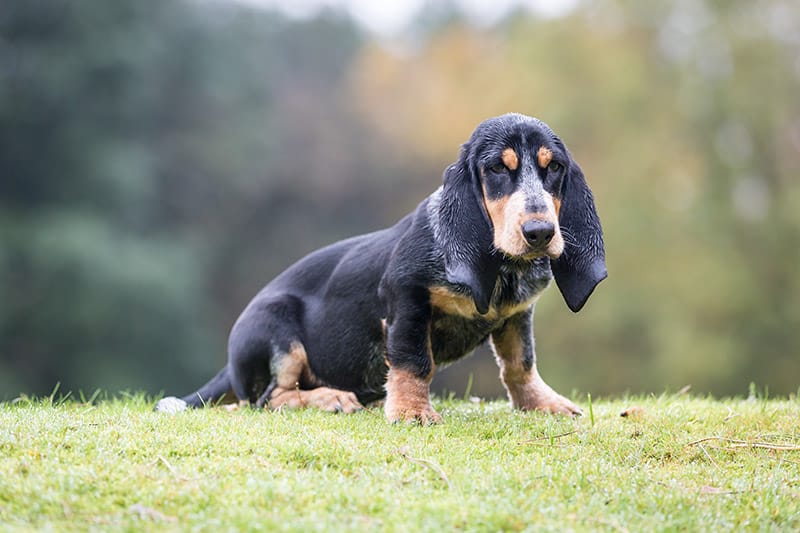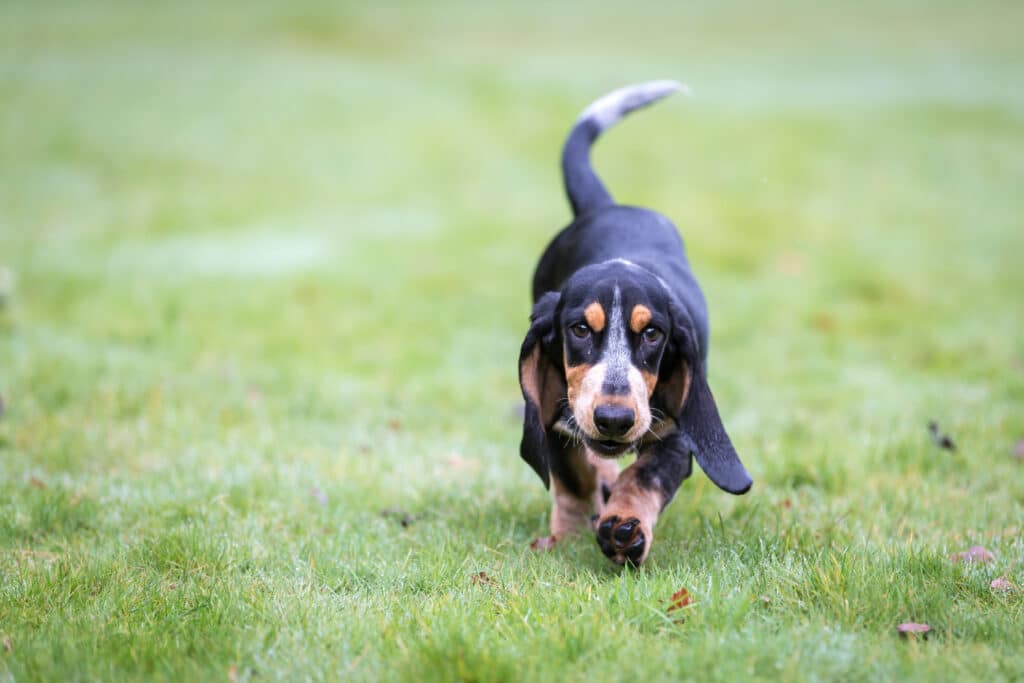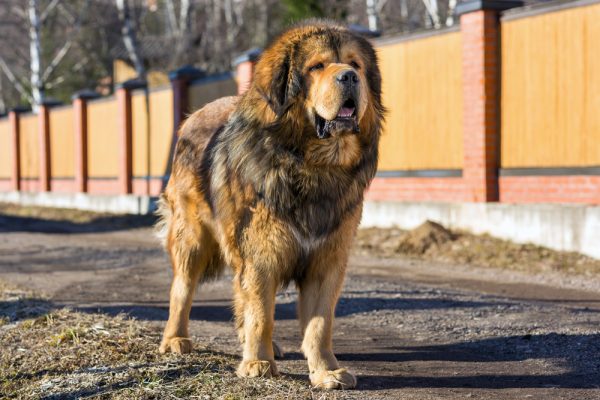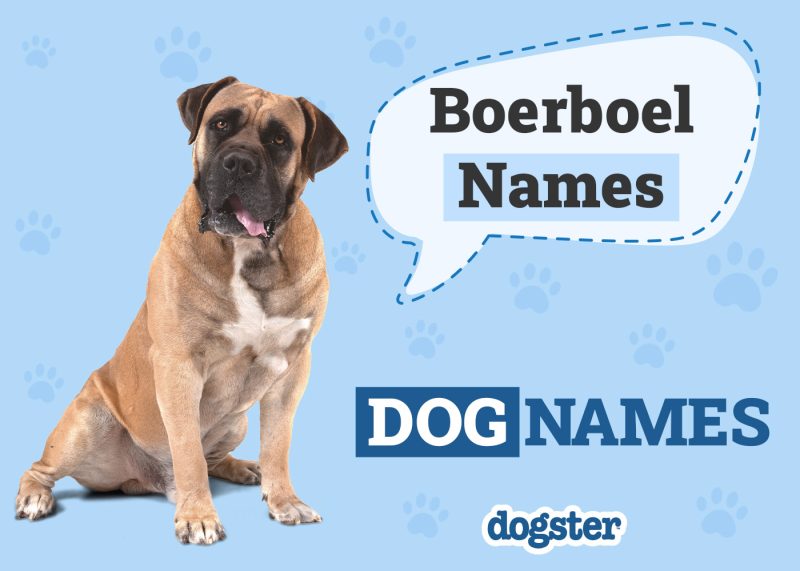In this article
View 8 More +Basset Bleu Gascogne dogs are gorgeous scent hounds with a long and storied history in their homeland of France, where they were prized for their hunting skills. They’ve most likely been around since the 14th century. These dogs have powerful voices, large floppy ears, short legs, and relatively long, sturdy bodies.
Breed Overview
Height:
13–15 inches
Weight:
35–40 pounds
Lifespan:
10–14 years
Colors:
A mixture of tan, blue, and black
Suitable for:
Active families, those looking for a companion who loves heading outdoors and participating in events like scent work competitions
Temperament:
Curious, loving, friendly, and devoted
Basset Bleu Gascognes are hard to find outside of France, and they almost went extinct toward the end of the 19th century. They’re active and athletic and generally love to engage in activities that enable them to use their fantastic noses, like hunting and scent work.
They’re affectionate with their owners and happy to spend time relaxing indoors or engaging in active endeavors outside.
Basset Bleu Gascogne Characteristics

Basset Bleu Gascogne Breed Puppies

If you have your heart set on welcoming one of these amazing dogs into your family, you may have trouble locating them since they’re quite rare outside of France, and breeders can be hard to come by.
Basset Bleu Gascogne dogs aren’t recognized by the American Kennel Club, which can give you an idea of how rare the breed is in places outside of their homeland.
The chances of finding a Basset Bleu Gascogne at a shelter aren’t that great, in part because there simply aren’t that many around. You may have more luck working directly with a breeder located in France.
If you’re fortunate enough to find a Basset Bleu Gascogne puppy, be prepared to begin training as soon as possible. These independent scent hounds can be stubborn, but they’re also incredibly smart and can be well-behaved when exposed to consistent, positive, reward-based training when young. Little ones that aren’t ready to head to puppy classes can master basic commands such as “sit” and “come” at home.

Temperament & Intelligence of the Basset Bleu Gascogne
Basset Bleu Gascogne dogs are friendly and easy-going. Some are energetic, and others prefer more leisurely activities, but even the dogs that like running around are generally more than happy to relax as long as their favorite people are around.
They can also have varied personalities. Some are happy interacting with new people, and others can be a bit standoffish. They’re hounds, so they have rich, full voices, which they’re often happy to use; Basset Bleu Gascognes are champion howlers.
They generally don’t make great apartment dogs because of their loud howling. Basset Bleu Gascognes are scent hounds, so even with adequate training, they’re inclined to fixate on smells, which can sometimes make them challenging to train.
Are These Dogs Good for Families? 👪
Basset Bleu Gascognes get along well with kids. They’re not very large, so they’re not prone to accidentally injuring small children while playing, and most are pretty mellow.
Does This Breed Get Along With Other Pets?
Basset Bleu Gascognes are hunting dogs. They have strong prey drives and can be triggered to chase smaller critters like rabbits.
They traditionally hunt in packs, and they get along well with other dogs; some like having canine buddies to hang out with at home. Well-trained and socialized pups do well with cats they’ve grown up around.

Things to Know When Owning a Basset Bleu Gascogne
Food & Diet Requirements🦴
Basset Bleu Gascognes don’t have any special dietary needs. Like all dogs, they do best when eating high-quality commercial food that contains all the vitamins and minerals they need to thrive.
Puppies generally need to eat food formulated specifically for them that provides more protein and fat than formulas designed for adults until they’re almost full size.
Veterinary guidance should always be sought before transitioning puppies to adult food to ensure their bodies are ready for the change. Basset Bleu Gascogne dogs can easily gain weight since they’re food-motivated, so keeping an eye on how much they eat is critical for keeping them healthy.
Exercise🐕
Basset Bleu Gascognes require regular exercise. Walks, hikes, and other outdoor activities are great activities for dogs that like getting out and about and being active.
However, some are just as happy to hang out at home and may need encouragement to get moving. Scent walks are beneficial tasks since they enable Basset Bleu Gascognes to use their incredibly powerful noses to explore the world.
Training 🎾
Basset Bleu Gascognes can be a bit difficult to train because they can make decisions on their own and can easily become distracted if they find a fun scent they’re interested in checking out. They’re trainable, but eliciting cooperation is a matter of using the right motivation, which usually involves food.
Early training is critical for Basset Bleu Gascognes, as it enables them to learn a few basic commands and become comfortable with the training process while they’re still puppies. Positive reinforcement training can help you teach your dog commands and tricks and strengthen your bond.
Grooming ✂️
Basset Bleu Gascognes have short coats that don’t require much maintenance, but they do shed. You can brush them a few times a week to stimulate their skin and remove loose hair. Since they have such large floppy ears, most Basset Bleu Gascognes benefit from having them regularly checked and cleaned if needed.
Check with your veterinarian before starting an ear cleaning routine to ensure you’re using an appropriate product and know how to get rid of debris without making things worse. Basset Bleu Gascognes only need baths when they get dirty, but keep in mind that they have a unique hound odor. They also require regular tooth brushing and nail clipping.
- See Also: Best Dog Shampoos
Health and Conditions 🏥
- Ear infections
- Bloat (GDV)
Basset Bleu Gascognes are relatively healthy; most live reasonably long lives of 10 to 14 years. The breed isn’t known for having lots of genetic issues to worry about. There are, however, a few conditions to be concerned about, including ear infections and bloat.
- Ear Infections
Basset Bleu Gascognes have long ears and are prone to developing ear infections. These can cause intense itching, which prompts dogs to scratch their ears more and causes redness and inflammation. Some infections result in a discharge or strong odor.
Ear infections can be caused by bacteria, fungi, tumors, and foreign objects that get stuck and cause irritation; it’s critical for dogs that have itchy ears to be seen by a veterinarian so the problem can be properly diagnosed. Ear infections generally resolve with prompt treatment, but left untreated, they can cause permanent hearing loss.
- Bloat
Bloat is a serious medical condition in which a dog’s stomach is stretched and cut off from blood, which can be fatal under certain circumstances. The stomach can become twisted and full of gas, resulting in gastric dilatation volvulus, or GDV, which is a medical emergency.
The causes of bloat aren’t terribly clear, but eating or drinking too much too fast and exercising right after eating appear to be risk factors. Large dogs and those with deep chests are also more inclined to have problems with the condition.
It’s a good idea to keep food safely secured to prevent dogs from helping themselves to large quantities of kibble (which can lead to bloat). Giving your dog plenty of time to digest their food before getting started with exercise and other physical activities may also help.

Male vs. Female
Male Basset Bleu Gascognes are larger than the females, but there are generally few sex-based differences in temperament and behavior when dogs have been altered.
Spaying and neutering not only prevents them from reproducing and contributing to the growth of the stray animal population, but the procedures also have health benefits. Spayed dogs don’t develop uterine infections, such as pyometra, and they don’t go into heat, which makes life easier for pet parents.
Neutering completely eliminates the chance that a dog will develop testicular cancer. Neutered dogs are more inclined to stay home and be mellow, and the procedure may also minimize mounting behavior.

3 Little-Known Facts About the Basset Bleu Gascogne
1. They’re Related to Basset Hounds
It’s difficult to distinguish between the Basset Bleu Gascogne and the Basset Hound, but they have a few differences. Basset Bleu Gascognes are lighter, have longer legs, and are an inch taller.
2. The Basset Bleu Gascogne Is One of Six French Hound Breeds
Although the French native has been around for centuries, the United Kennel Club didn’t recognize them until 1991. They nearly went extinct in the late 19th century, but a breeder increased their numbers in the 20th century by crossing them with the Grand Bleu de Gascogne and the Basset Saintongeois.
3. They’re Related to Grand Bleu de Gascognes
The Grand Bleu is a much larger canine that can reach up to 27 ½ inches at the withers. The Basset Bleu’s size was reduced so they could hunt rabbits more effectively. In the United States, both the Basset Bleu and Grand Bleu are rare and difficult to find.

Final Thoughts
Basset Bleu Gascognes are fun, friendly, athletic dogs that make excellent buddies and companions, particularly for people who enjoy outdoor activities like taking long walks and hiking. They’re medium-sized and low to the ground and have beautiful floppy ears and distinctive coats with adorable tan markings.
While they’re great around children, they’re not well suited for apartment life due to their powerful voices. As pack animals, they generally enjoy homes where they have plenty of companionship.
Featured Image Credit: Daz Stock, Shutterstock


















